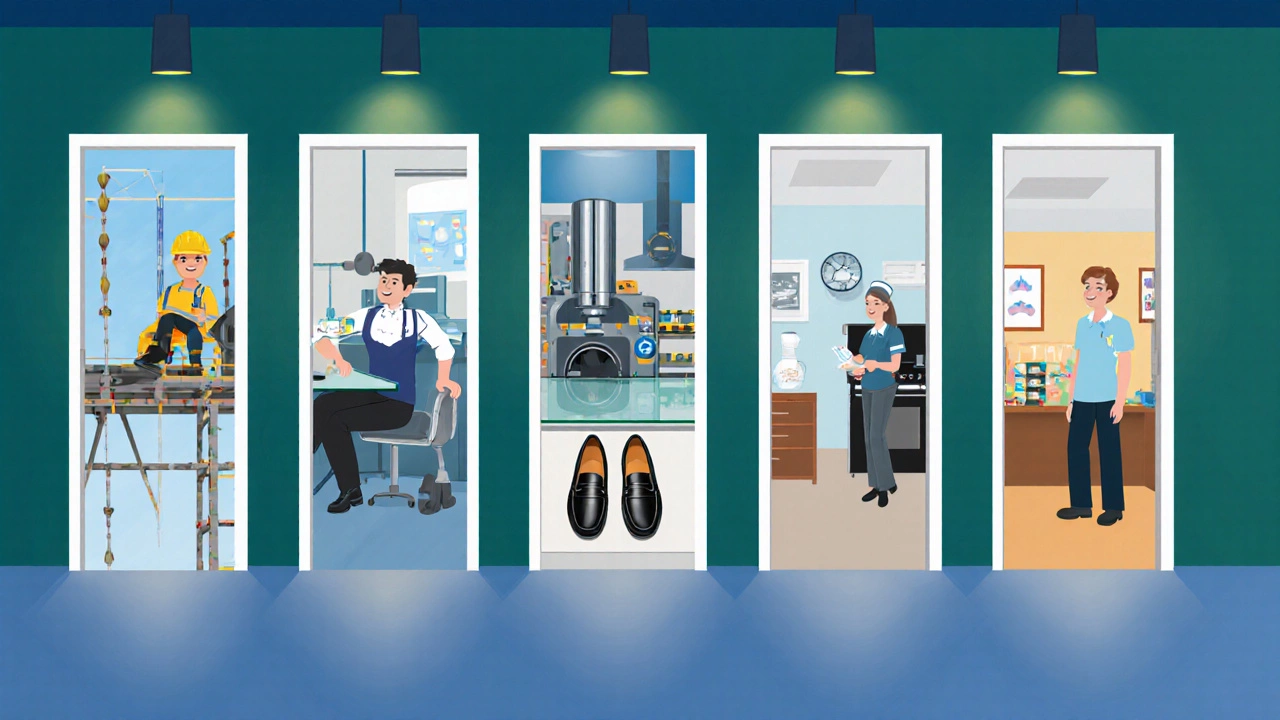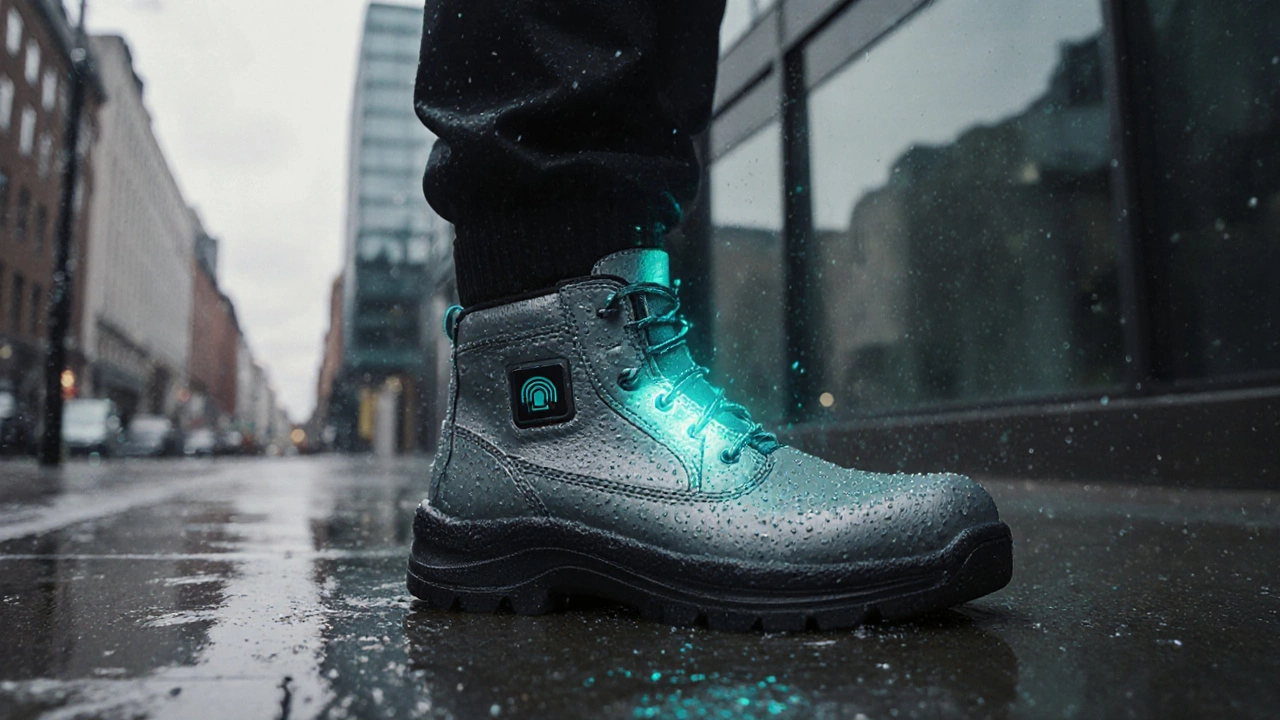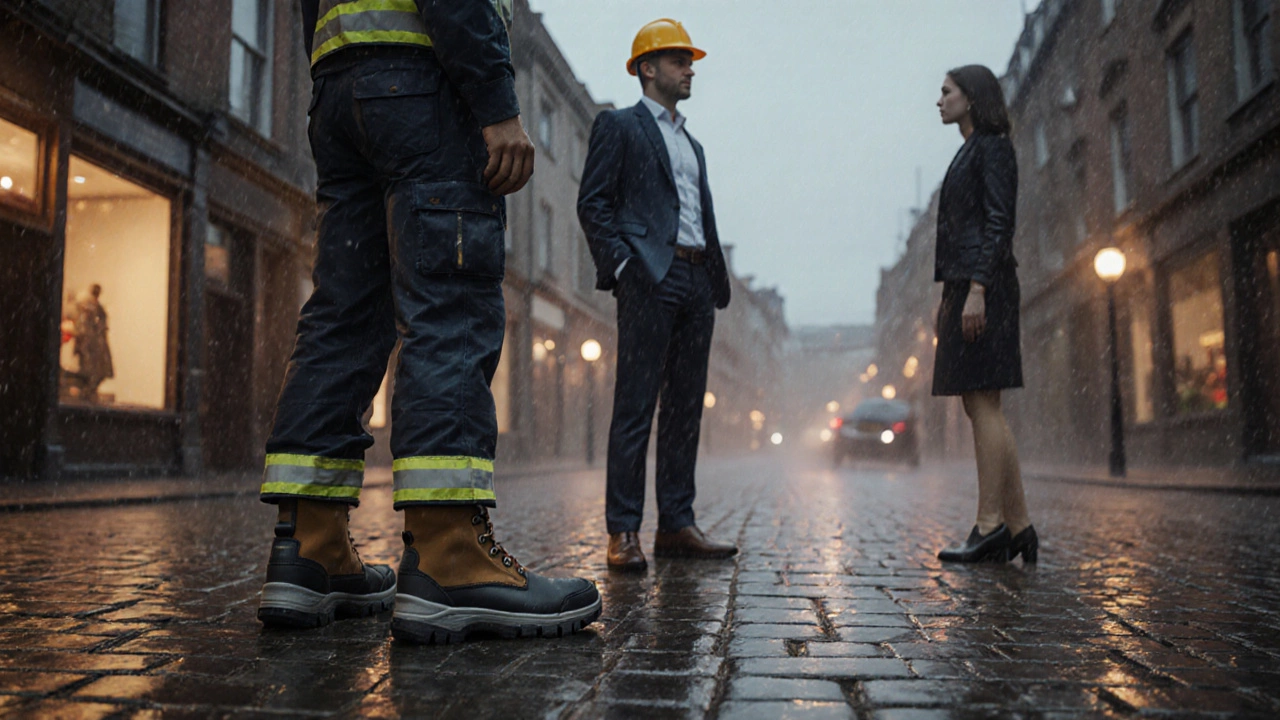Workplace Footwear Checker
What's your workplace sector?
Select your job category to see what footwear is approved for your Irish workplace environment
Construction
(Cork, Galway, Dublin sites)
Manufacturing
(Factories, warehouses)
Office
(Tech, finance, admin)
Hospitality
(Hotels, restaurants)
Retail
(Customer service, sales)
Healthcare
(Hospitals, clinics)
Approved Footwear
Prohibited Footwear
In Ireland, the rules around work shoes Ireland can feel like a maze, especially when the weather flips from sunny Dublin streets to a rainy Galway afternoon. Whether you’re heading to a construction site in Cork, a tech office in Dublin’s Docklands, or the front desk of a hotel in Killarney, the right pair of shoes keeps you safe, looks professional, and stops you from getting a nasty cold.
Key Takeaways
- Irish workplaces follow HSA‑mandated safety standards (EN ISO 20345) for high‑risk jobs.
- Office environments usually require smart‑casual footwear-think leather loafers or clean sneakers.
- Seasonal weather means waterproof soles and good grip are essential year‑round.
- Local retailers like Clarks Ireland and Shoe Tree Dublin stock approved styles that meet both safety and style criteria.
- Always check your employer’s dress‑code policy; it often references the Health and Safety Authority (HSA) guidelines.
Why footwear matters in Irish workplaces
From the bustling streets of Dublin to the rugged farms of County Mayo, the Irish climate and terrain shape the daily grind. Wet pavements, slippery slate floors in historic pubs, and heavy equipment on construction sites all pose slip, trip, and fall hazards. The Health and Safety Authority (Health and Safety Authority, HSA) estimates that slips account for 30% of workplace injuries in Ireland each year. The right shoes are the first line of defence against those numbers.
Legal backdrop: Irish Labour Law and safety standards
Irish labour law doesn’t spell out a specific “shoe list,” but it obliges employers to provide a safe working environment under the Safety, Health and Welfare at Work Act 2005. That translates into two practical rules:
- The employer must supply or ensure the use of footwear that meets the European standard EN ISO 20345 for high‑risk roles (construction, manufacturing, warehousing).
- For low‑risk settings-offices, retail, hospitality-the employer can set a dress‑code as long as it’s reasonable, non‑discriminatory, and still protects the worker from obvious hazards.
In short, if your job involves heavy machinery, you’ll see a safety‑toe requirement. If you’re behind a desk, the focus shifts to appearance and basic comfort.
Sector‑by‑sector shoe guide
Below is a quick snapshot of what’s typically allowed (and what to avoid) across common Irish work environments.
| Sector | Allowed Shoes | Prohibited Shoes | Key Tips for Irish Weather |
|---|---|---|---|
| Construction | Steel‑toe boots, EN ISO 20345‑compliant, waterproof | Dress shoes, open‑toe sandals | Deep tread, water‑resistant leather |
| Manufacturing | Composite‑toe safety shoes, slip‑resistant soles | Canvas sneakers, flip‑flops | Anti‑static midsoles for electronics factories |
| Office (tech, finance, admin) | Leather loafers, clean low‑profile sneakers, smart‑casual shoes | Heavy boots, overly casual flip‑flops | Water‑repellent leather for rainy commutes |
| Hospitality (hotels, restaurants) | Polished leather shoes, non‑slip chef shoes, discreet sneakers | Open‑toe sandals, high‑heel stilettos in kitchen | Quick‑dry uppers for spills |
| Retail & Customer Service | Comfortable leather shoes, slip‑resistant loafers, neat trainers | Heavy work boots, casual sandals | Breathable mesh lining for long shifts |
| Healthcare (hospitals, clinics) | Enclosed nursing shoes, anti‑microbial fabric, slip‑resistant | Open sandals, high heels, open‑toe shoes | Easy‑clean materials for hygiene |

Choosing shoes that pass the test and look good
Even if a shoe meets safety standards, you’ll still want something you can wear from the office to a pint at the local pub after work. Here’s a five‑step process to find the perfect pair:
- Know your sector’s requirement. Check your employee handbook for any mention of EN ISO 20345 or “steel‑toe” language.
- Measure your foot correctly. Irish shoe sizes run a bit larger than UK sizes; a size 42 EU often translates to a size 8.5 UK. Use a Brannock device at a store like Clarks Ireland for an accurate fit.
- Test the grip. Walk on a wet tile surface in the store; a good slip‑resistant sole will feel stable even when you lift your foot.
- Check material durability. Waterproof leather or treated suede handles Dublin rain. Look for Gore‑Tex linings if you’ll be outdoors often.
- Try them on with your work attire. Slip the shoes on with the trousers or uniform you’ll wear; you shouldn’t have to tug or roll them up.
Local retailers like Shoe Tree Dublin and Bespoke Shoes Dublin carry both safety‑rated boots and smart‑casual options that meet the Irish dress code while still looking sharp.
Seasonal hacks for Irish weather
Rain is practically a national sport, so a good pair of shoes should handle puddles without soaking your feet. Here are a few extra tricks:
- Water‑proof sprays. Products from local brand Shoe Guard Ireland add a protective coating that repels moisture.
- Replace insoles. Breathable, moisture‑wicking insoles keep feet dry during long shifts, especially in Belfast’s cooler climate.
- Carry a spare pair. Many Dublin commuters keep a second pair of shoes at work to swap out after a rainy commute.
- Use shoe trees. Wooden shoe trees prevent creases and help the leather stay shape-handy when you stash shoes in a flat for the weekend.
Common pitfalls and how to avoid them
Even seasoned workers slip up. Here’s what to watch out for:
- Confusing fashion sneakers with safety shoes. A sleek trainer might look office‑friendly, but unless it has EN ISO 20345 certification, it’s illegal on a construction site.
- Ignoring employer‑specific rules. Some hospitals in Cork require anti‑static shoes for certain wards; failing to comply can jeopardise patient safety.
- Choosing the wrong size. Too tight causes blisters; too loose reduces stability, especially on wet cobblestones in Galway.
- Neglecting maintenance. A cracked sole loses slip resistance. Inspect your shoes weekly and replace when the tread wears below 3 mm.

How to get clearance for “smart‑casual” shoes in a corporate setting
Many Dublin tech firms have a relaxed dress code, but they still expect footwear to be tidy and professional. Here’s a quick email template you can send to HR:
Subject: Footwear Approval Request - [Your Name]
Hi [HR Contact],
I’m writing to confirm that my planned footwear complies with our office dress‑code. I intend to wear a pair of leather low‑profile sneakers (brand: Adidas Stan Smith) that are clean, non‑glossy, and have a slip‑resistant sole.
Please let me know if any adjustments are needed.
Thanks,
[Your Name]
Getting a quick “OK” eliminates any awkward foot‑wear moments during meetings with the Garda in the building’s security lobby.
Where to buy approved shoes in Ireland
Below is a shortlist of reliable retailers that stock both compliant safety footwear and smart‑casual office shoes:
- Clarks Ireland - wide range of leather loafers and EN‑certified boots.
- Shoe Tree Dublin - locally sourced leather, quick‑dry trainers.
- Boots Ireland - carries medical‑grade nurse shoes with anti‑microbial lining.
- Halfords Ireland - good selection of composite‑toe work boots for construction.
- Online - Irish Safety Store - offers direct purchase of EN ISO 20345‑certified footwear with same‑day dispatch from Dublin.
Future trends: Sustainable and smart footwear
Irish companies are pushing greener options. Look out for shoes made from recycled rubber soles and vegetable‑tanned leather-brands like Allbirds Ireland are testing eco‑friendly safety lines. Some large manufacturers are also embedding RFID chips in boots to track wear‑and‑tear, helping safety officers schedule replacements before a sole fails.
FAQ
Do I need steel‑toe shoes for a retail job?
Most retail roles in Ireland only require slip‑resistant, closed‑toe shoes. Steel‑toe boots are usually reserved for construction, warehousing, or heavy‑equipment environments.
Can I wear fashionable sneakers in an office?
If the sneakers are clean, low‑profile, and have a non‑glossy finish, many Irish offices allow them. Always double‑check your company’s dress‑code policy first.
What does EN ISO 20345 mean?
It’s a European safety standard for work boots. The mark guarantees features like a steel toe, slip‑resistant sole, and resistance to oil and fuel - essential for high‑risk jobs in Ireland.
Are there tax benefits for buying work shoes in Ireland?
Employers can claim a tax deduction for providing mandatory safety footwear, but individuals generally cannot claim a personal expense unless the shoes are a required part of a protected occupation.
How often should I replace my safety boots?
Inspect them monthly; replace when the sole tread drops below 3 mm or the toe cap shows signs of deformation-usually every 12‑18 months for daily construction wear.
Now you’ve got a clear roadmap for picking shoes that keep you safe, look good, and satisfy Irish workplace rules. Whether you’re strolling through the streets of Dublin, navigating a Belfast warehouse, or serving guests at a Galway hotel, the right pair of shoes will let you focus on the job, not the foot pain.
